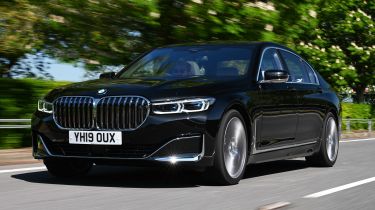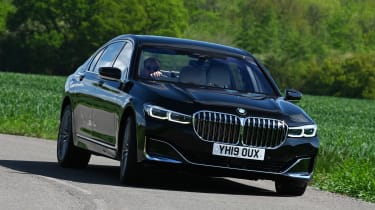BMW 7 Series (2015-2022) review - Engines, performance and drive
Smooth, powerful and a very refined way to make progress, but the 7 Series is best experienced as a passenger

With such a huge array of interior tech and acres of space, it seems a bit of waste to spend your time behind the wheel of the 7 Series where you can’t experience any of it. So, the best way to make the most of BMW’s flagship is to get someone to drive it for you – something frequently done by the type of people who buy this type of car.
However, if you do find yourself having to get behind the wheel it’s one of the better luxury saloons for keener drivers. The 7 Series feels more agile than the Mercedes S-Class or Audi A8 due to the use of lightweight carbon fibre in its construction. The steering could do with some added weight as it is quite light, but it’s accurate enough.
The 3.0-litre diesel in the big-selling 730d model works seamlessly alongside an eight-speed automatic gearbox, allowing for smooth and relaxing progress. It’s as accomplished as you’d expect any six-cylinder BMW to be. The 7 Series is also deceptively quick as it’s so quiet, so you pick up speed very quickly without realising you’re doing so.
In all honesty, few will ever require more than that offered by the 730d. BMW's 740d is xDrive (four-wheel drive) only, which may prove useful during our notoriously wet winters.
Used - available now

2019 BMW
7 Series
35,605 milesAutomaticDiesel3.0L
Cash £32,240
2022 BMW
7 Series
44,574 milesAutomaticPetrol3.0L
Cash £32,920
2018 BMW
7 Series
46,000 milesAutomaticPetrol4.4L
Cash £27,850
2022 BMW
7 Series
40,499 milesAutomaticPetrol3.0L
Cash £36,990The 740i six-cylinder petrol and the V8 powered 750i, while nice and untapping some proper performance in the 750i’s case, strike us as being left-field choices. The one-size-fits-all 730d is a solid choice, with the plug-in hybrid 745e an efficient option that will probably hold more appeal with business users. The bonkers, V12-powered M760Li is no longer available on the 7 Series price list.
Air suspension comes as standard on every model and ride quality stacks up very well indeed. However, the BMW’s setup isn’t quite as mastered as what you’ll find springing its chief rival: the Mercedes S-Class.
It’s just ever so marginally firmer than an S-Class – a trade-off for its marginally better handling characteristics. There’s a special ‘adaptive’ mode for the suspension, which uses the car’s navigation to set the car up for the road and terrain that’s coming up ahead.
The range-topping M760Li xDrive model uses clever tech to limit body roll and add a touch of rear-wheel steering to increase agility. It doesn't transform the big car into a sports model, but will surprise you with a degree of sportiness that rivals miss out on.
0-62mph acceleration and top speed
The base 7 Series is the 730d and it’s more than sufficient for most buyers’ needs. Powered by a smooth six-cylinder, 3.0-litre turbocharged diesel engine, power stands at 261bhp. 0-62mph is dispatched in a hot-hatchback-rivalling 6.1 seconds, with top speed limited to 155mph.
Over the last few years this has been by far the biggest-selling model, hence why the 730d powertrain is available in six specific models. Alongside the regular 730d, there’s the all-wheel-drive 730d xDrive and the long-wheelbase 730Ld. All models are available in racy-looking M Sport trim too. xDrive cars are quicker to 62mph (5.8 seconds), with the extra heft of the long-wheelbase 730Ld dropping the benchmark sprint down to 6.2sec.
For extra diesel shove, the 740d xDrive uses a more powerful version of BMW’s 3.0-litre turbodiesel. It develops 316bhp and features all-wheel drive by default, dropping 0-62mph to 5.3 seconds. Few will need more than the 730d, however.
If you prefer petrol, there's a punchy 3.0-litre inline-six 740i with 335bhp or the powerful 528bhp V8 750i, with the former offered in long or short wheelbases; the 750i is considered sportier and only comes on the shortened platform.
The 740i manages 0-62mph in 5.5 or 5.6 seconds, and the 750i shaves that to 4.7 seconds. The 4.4-litre turbo V8 unit is shared directly with the latest M850i, but it’s not as boisterous in this application and noise is kept at a disant burble due to the 7 Series’ sound-deadening.
The (now discontinued) M760Li held the title of fastest-ever BMW with a 0-62mph time of 3.7 seconds, until it was matched by the M850i coupe. Sadly, it won’t be able to reclaim its crown, but you may wish to track down a used example, as it’s absurdly fast for such a large car and few full-size luxury saloons are quite as characterful.
The new 745e and 745Le plug-in hybrid options are impressive, and are our favourites. While the previous PHEV 7 Series was a four-cylinder, this new six-cylinder setup feels far more befitting of the model’s prestige and adds an extra degree of smoothness, refinement and performance to the hybrid option. The six-cylinder engine develops 282bhp, with 111bhp from the electric motor. Peak combined power is 389bhp with a colossal 600Nm torque.
Priced roughly the same as the V8 powered 750i, the 745e is a completely different proposition, majoring on the quietness of its powertrain and the ability to glide silently on electric power only. Immediately, it makes sense in a car like this but it’s not short of performance either, with the long-wheelbase xDrive equipped version managing 0-62mph in 5.1 seconds. To drive, it does well to hide the heft of its battery and motor setup too.






